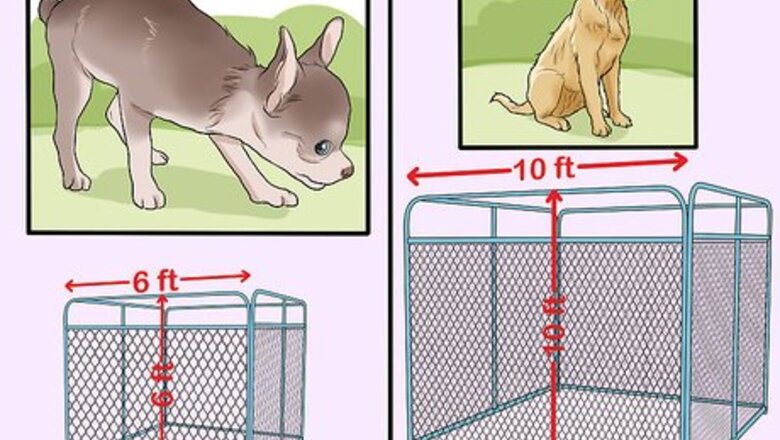
views
Designing Your Dog Kennel
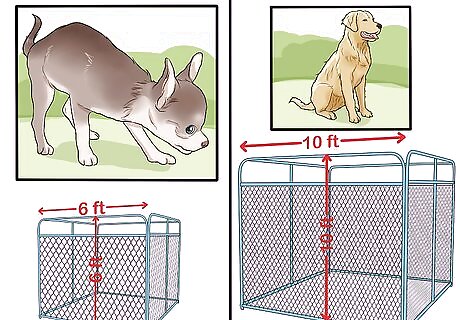
Decide how big the kennel will be. The size of the kennel should be based on how big your dog is and how long it will be in the kennel each day. The larger your dog and longer amount of time it will spend in the kennel, the larger the kennel should be. For example, for a smaller dog like a chihuahua, a kennel that is around 6 feet (1.8 meters) long and 6 feet (1.8 meters) wide would work. If you have a large dog, like an adult golden retriever, aim for a kennel that's at least 10 feet (3 meters) long and 10 feet (3 meters) wide.
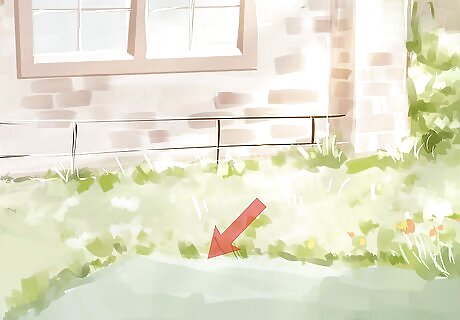
Pick a spot in your yard for the kennel. Choose an area away from nearby sidewalks or streets if you're worried about your dog barking at people walking by. Look for a spot in your yard that gets a lot of shade during the day, like a spot under a large tree. Put the kennel off to the side or in a corner of the yard so it doesn't get in the way.
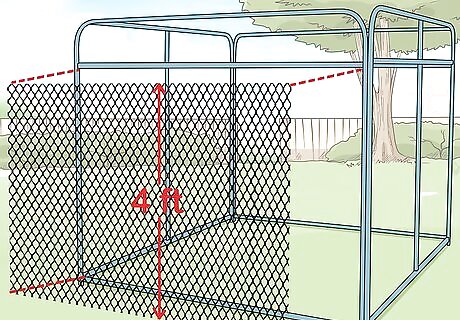
Use chain link fencing for the kennel’s perimeter. Chain link fencing is more affordable than other fencing options, and it's secure. Get fencing that’s at least 4 feet (1.2 meters) tall. You may need taller fencing if you have a large dog. You can find chain link fencing at your local hardware store. Your fencing should also come with a gate, posts, top rails, and the necessary attachments for putting up the fence.
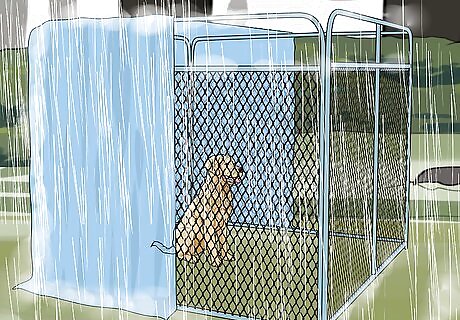
Give your dog shelter from the elements. It's important you provide somewhere for your dog to go in case it's raining or hot outside. Decide whether you want to put a dog house in the kennel or install a roof over it. If you go with a dog house, make sure it's not so tall that your dog can use it to escape over the side of the kennel. A cheap shelter solution is to install a tarp roof over half of the kennel.
Getting the Kennel Area Ready
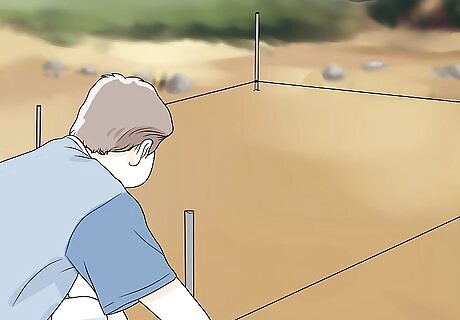
Use wood stakes and twine to mark where the kennel will go. Use a tape measure to measure the distance for each side. Hammer a stake into the ground where each corner of the kennel will be. Connect the stakes with twine so you have a square or rectangular perimeter where the kennel will be set up.
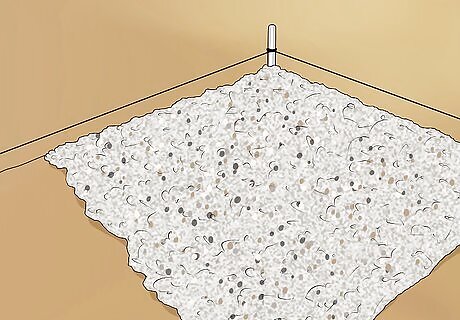
Lay down a floor if your dog likes to dig. Build the kennel over grass if at all possible. However, if you’re worried your dog could dig its way out of the kennel, you should put down a pea gravel or flagstone flooring. Lay down a sheet of landscaping fabric before you put down the flooring to keep weeds out. Do not use concrete as flooring. Concrete causes damage to dogs’ paws and joints. If you use gravel, you’ll have to add more each year. Some gravel will be lost when you pick up dog poop in the kennel.
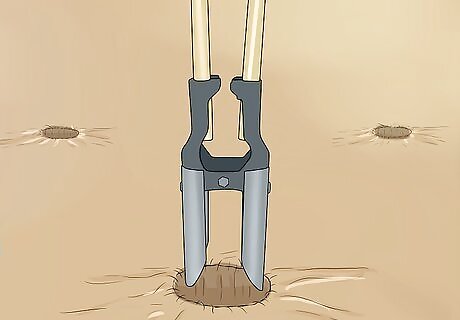
Dig holes for the fence posts using a post-hole digger. You don’t need to use an expensive one; a cheap post-hole digger from your local hardware store will work. Use the post-hole digger to dig a 2 foot (0.6 meters) hole at each corner. Make the holes twice the diameter of the fence posts, about 6 inches (15.2 cm). For a large kennel, you may want to put a post in between each of the corner posts for extra support. Add a 2 inch (5.1 cm) layer of gravel to the bottom of each post hole to help with drainage.
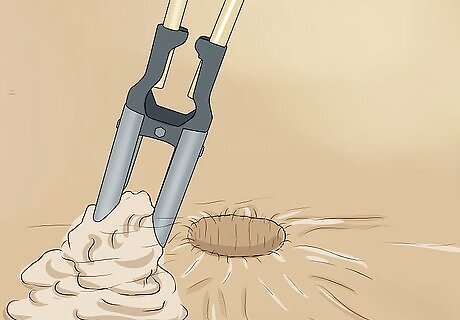
Dig a hole for the post the gate will attach to. Choose which side you want the gate to be on. Pick one of the corner posts on that side that you want the gate to be next to. Use a tape measure to measure the length of the gate. Make the distance between the corner post hole and the new hole the same as the length of the gate. For example, if your gate is 45 inches (114 cm) long, the distance between the center of the corner post hole and the center of the new hole you’re digging should be 45 inches (114 cm).
Installing the Fencing
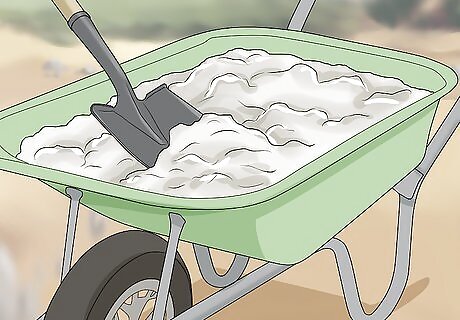
Mix concrete and water in a wheelbarrow. Find a cheap bag of concrete at your local hardware store. Pour the bag of concrete into the wheelbarrow. Read the instructions on the side of the bag for how much water to mix in. Pour the water in and stir the mixture with a gardening hoe until the concrete is completely mixed in with the water. Always wear gloves and protective glasses when you’re mixing concrete.
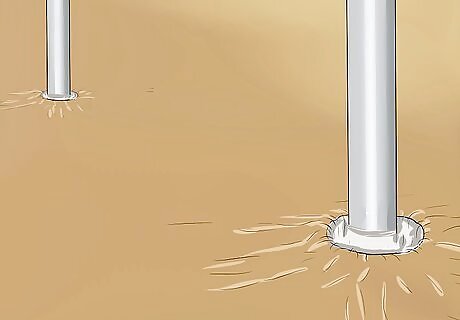
Cement the posts into the post holes. Center a post in one of the holes and pour the concrete mixture into the hole using the wheelbarrow. Fill the hole all the way up until the concrete is level with the ground. Use a leveler to check if the post is straight. Repeat with all of the fence posts. Recruit a helper for this process. It’s easier to pour the cement if you have someone else holding the posts in the hole while you pour. If there’s no one around to help, tie a rope around the post and stake the two ends of the rope into the ground to steady it in the hole.
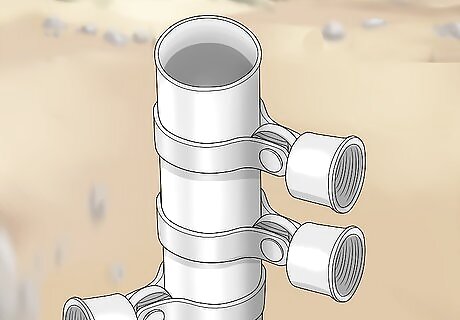
Add the tension bands to the posts. The tension bands are the thick metal bands with bolts attached. Slide three tension bands onto each middle post (one goes up top, one in the middle, and one at the bottom). Slide six tension bands onto each corner post (two at the top, two in the middle, and two at the bottom). Tighten the bands into place by turning the bolts. The long, flat side of the tension band should be parallel with the outside of the fence.
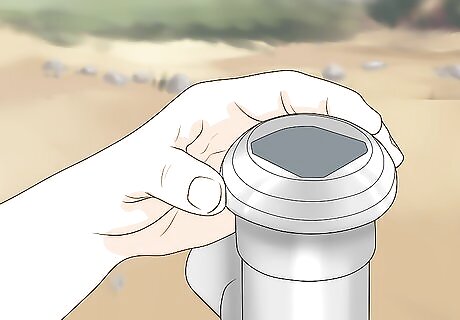
Add the cups and caps to the top of the posts. The cups are the metal bands with sockets attached. Each corner post should have two cups. Slide the cups onto the corner posts, one on top of the other. The sockets on the cups should each be facing a different neighboring post. Top off each post with one of the rounded caps. The middle posts should be topped off with a cap that has a ring on top of it.
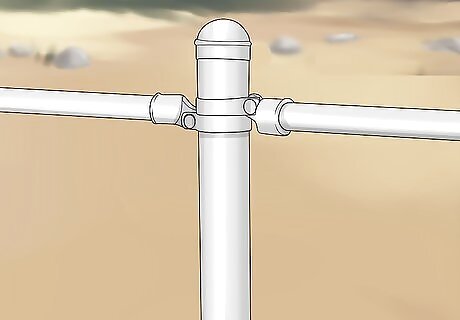
Insert the top rails into the posts. The top rails are the long metal tubes that will be the top of the fence. Slide a top rail through the ring on one of the middle post caps and insert the end of the rail into the cup on a corner post. Tighten the bolt attached to the cup. Slide the end of another top rail over the thin end of the first top rail so they’re connected. Insert the other end of the second rail into the cup on the neighboring corner post. Repeat the process on the other three sides of the kennel.
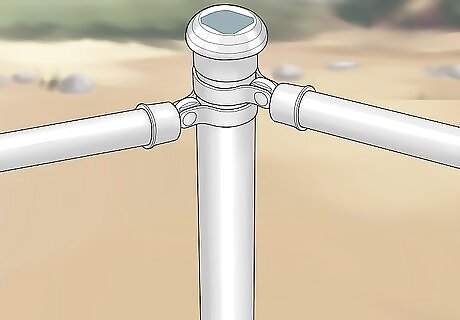
Attach the fencing to a corner post. Unroll the fencing and line up the end with one of the corner posts. Slide a tension bar (one of the thin, flat metal bars that came with your fence supplies) down through a link at the top of the fencing and through the tension band on the post. Continue to slide the bar down through the individual links at the end of the fencing until you reach the bottom tension band. Tighten the bolts on each tension band to secure the tension bar in place. After the tension bar is in place, tie the top of the fence to the top rail using a chain metal tie.
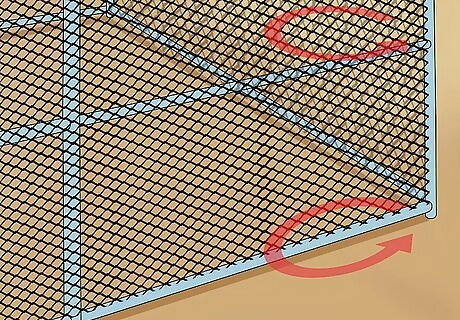
Unroll the fencing to an adjacent corner post. Pull the fencing so it’s taut and repeat the process with the tension bar to secure the fence to the corner post. Tie the top of the fencing to the top rail. If there’s a middle post in between the two corner posts, tie the fencing to the post using a metal tie.
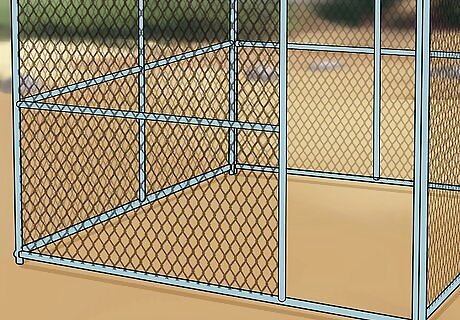
Add fencing to the remaining sides of the kennel. Leave the space you made for the gate empty. When you’re finished, the fencing on all four sides of the kennel should be taut and secure. Use your hands to push and pull on the fencing to see if any bolts need to be tightened more.
Attaching the Kennel Gate
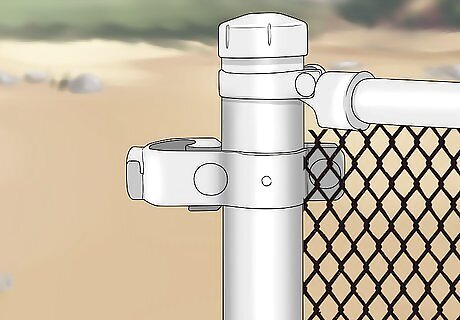
Put the hinges for the gate on the gate post. Slide the two hinges onto the gate post and secure them in place by tightening the bolts. One hinge should be 8 inches (20.3 cm) from the top of the gate post. The other hinge should be 8 inches (20.3 cm) from the bottom of the gate post. The pin on the top hinge should be facing downward, and the pin on the bottom hinge should be facing up.
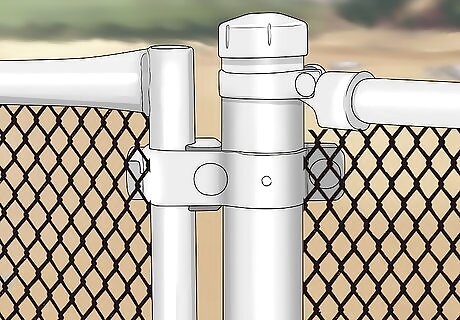
Attach the gate to the hinges on the gate post. Use the gate that you purchased with the chain link fencing. Position the gate so it’s about 2 inches (5.1 cm) above the ground. Slide the hinges on the gate onto the corresponding pins on the gate post. Tighten the bolts on both hinges to secure the gate in place.
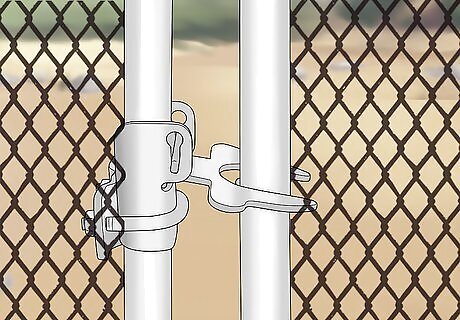
Secure the gate latch on the gate. Position the gate latch so it’s on the opposite side of the hinges. Adjust the height of the latch until you find a spot you’re comfortable with. Hold the latch steady and tighten the bolt attached to the latch to secure it on the gate.


















Comments
0 comment